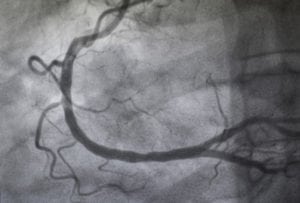Cardiac Catheterization
 A coronary angiogram (or cardiac catheterization) is an imaging procedure that explores the heart, searching for any looming cardiac conditions, such as abnormal blood flow. This test is a bit more invasive than other cardiac exams offered at Midcoast Cardiovascular Associates, as it requires the introduction of a narrow catheter directly into the heart. The catheter we use is soft and slim, so that it provides safe cardiac exploration without damaging delicate tissue.
A coronary angiogram (or cardiac catheterization) is an imaging procedure that explores the heart, searching for any looming cardiac conditions, such as abnormal blood flow. This test is a bit more invasive than other cardiac exams offered at Midcoast Cardiovascular Associates, as it requires the introduction of a narrow catheter directly into the heart. The catheter we use is soft and slim, so that it provides safe cardiac exploration without damaging delicate tissue.
What You Can Expect From This Procedure
Dr. Ginkel expertly performs this cardiac angiography using three variable approaches. The most common method used in cardiac angiography is to insert the catheter through the femoral artery in the groin. Alternative avenues include using the brachial artery (located in your arm) and radial artery (located in your wrist). While these other access methods aren’t an option for every patient, they do offer advantages for some. Dr. Ginkel will explain the feasibility of either approach as it applies directly to your unique case.
The femoral artery is the most accessible and commonly used pathway to the heart. After injecting a special contrast dye into the heart’s vessels, Dr. Ginkel uses x-rays to carefully monitor the migration of blood through your arteries to ensure that they are clear and open. Once we inject the dye into your blood vessels, we can see the pathways of the blood to the heart. The procedure takes about an hour to complete, although if you choose the femoral artery approach, you will need to lay flat for a few hours to make sure that there’s no additional bleeding at the catheter entry point.
Who Needs a Cardiac Angiography and Why?
Not all cardiovascular patients will need a cardiac angiography, but if you display symptoms of any potentially serious heart conditions, you may be a candidate. Dr. Ginkel will recommend this procedure if:
- You’re exhibiting angina (chest pain)
- You’re short of breath
- You’ve suffered a heart attack in the past and are experiencing pain
- You’ve had an echocardiogram or stress test revealing abnormal results
To see particular issues located within the heart, we need to go further than simple surface testing. These issues include coronary blockages or cholesterol buildup that may lead to more serious problems, such as a heart attack. Dr. Ginkel offers these exams to make sure you have the opportunity to proactively address cardiovascular disease in its earliest stages, instead of during an emergency down the road.
Results of the Cardiac Angiography
Since the injected contrast dye shows up in the x-rays of your coronary arteries and heart chambers, it is easier for Dr. Ginkel to accurately assess and explain the results to you. Based on the information from your angiography, Dr. Ginkel may recommend the following cardiac interventions:
- Medical therapy
- PCI (Percutaneous Coronary Intervention)
- Coronary artery bypass
- Heart valve repair or replacement
Before considering cardiac angiography, Dr. Ginkel will first perform all of the necessary non-invasive imaging exams. He will then offer a risk assessment and advise you on the best approach to this procedure, explain the surgery in detail, and answer any questions you may have. During your consultation and as you’re undergoing testing, Dr. Ginkel will inform you of anything that requires attention. Call Midcoast Cardiovascular Associates today at 805-354-0112 to start preparing for the rest of your life.
Recent Comments